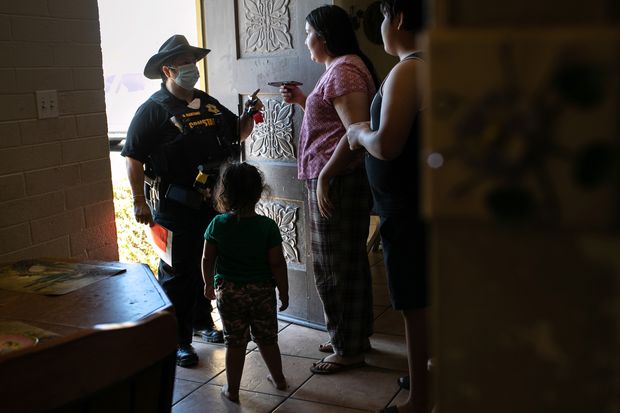
The CDC’s national eviction moratorium doesn’t automatically cover every tenant. Renters must fill out paperwork to be protected. Landlords aren’t required to tell tenants about the ban.
Photo by John Moore/Getty Images
The U.S. Centers for Disease Control and Prevention’s nationwide eviction ban has been in effect for nearly two months — but landlords and tenants alike are still trying to figure out how the moratorium works and what protections it offers.
The moratorium, which went into effect Sept. 4 and lasts until the end of the year, was meant to prevent a massive wave of evictions that some had feared could happen as a result of the pandemic-induced economic downturn. If millions of Americans lost their homes, it could complicate efforts to combat the coronavirus pandemic, public health officials have warned. Some property owners, however, have taken the issue to court, arguing that the CDC didn’t have the authority to issue the national moratorium.
The moratorium’s protections were not granted automatically to all tenants. Instead, renters essentially have to opt in by notifying their landlord with a signed affidavit that they cannot afford their full monthly rental payments. The CDC has provided a version of the affidavit, though renters don’t need to use the CDC’s form. The National Low Income Housing Coalition has versions of the form translated into many different languages including Spanish, Arabic, Chinese, Creole, Tagalog and Vietnamese.
But as MarketWatch previously reported, the CDC’s moratorium included vague language, leading some to worry about potential loopholes that could leave renters vulnerable to becoming homeless.
Don’t miss: CDC’s eviction moratorium doesn’t automatically protect renters — here are the strict criteria you must meet
After the CDC’s moratorium went into effect, MarketWatch launched an email hotline for readers to send questions about how the order works and how it could affect them.
Have questions about how the national eviction moratorium works as a landlord or renter? Email us at [email protected]
Here are answers to some of the questions readers have sent in.
Can my landlord still file for eviction against me?
Because renters need to be proactive to receive protection under the moratorium, those who don’t do so can still face eviction. Since the moratorium was first announced in early September, the country has seen nearly 9,500 eviction filings by private-equity firms and other corporate landlords, according to data from the Private Equity Stakeholder Project. These represent filings in just five states: Arizona, Texas, Tennessee, Georgia and Florida.
And the number has trended up recently — in the week ending Oct. 16 there were nearly 2,000 eviction cases filed, which was nearly double the number from the previous two weeks.
New guidance from the Trump administration suggests that even tenants who fill out the required affidavit could be taken to court by their landlord.
The Trump administration issued a “Frequently Asked Questions” document about the national eviction moratorium, outlining tenants’ and landlords’ rights under the order. The document notes that landlords aren’t required to make their tenants aware of the moratorium.
It also states that the eviction ban “does not preclude a landlord from challenging the truthfulness of a tenant’s declaration in any state or municipal court.” The document also stated that the moratorium does not prevent landlords from starting eviction proceedings so long as the eviction does not occur before the end of the year.
“The FAQ unfortunately puts more power back in the hands of landlords,” said Diane Yentel, president and CEO of the National Low Income Housing Coalition. “It creates new burdens for renters and new holes in their protections from eviction.”
As a result, renters in such a scenario could face additional challenges, some of which could have long-term impacts. Eviction filings can make it harder for renters to secure safe and affordable housing in the future, Yentel said. Moreover, landlords can use the threat of taking their tenants to court as a scare tactic.
“Sometimes renters will leave an apartment because eviction seems inevitable and they want to avoid that harm on their record,” Yentel said.
What should I do if my landlord takes me to court?
How courts handle eviction cases varies from state to state, but legal experts stressed that tenants must make every effort to appear on the court date they are assigned.
“Some states have adopted rules that require landlords to disclose whether a CDC declaration has been received,” said Eric Dunn, director of litigation at the National Housing Law Project. “But for the most part, if the tenant doesn’t appear and inform the court that they presented a declaration, the court won’t be aware of that and will likely enter a default judgment against the tenant.”
Because there is no specified deadline by which a renter must make their declaration to their landlord, the renter could even theoretically present it in court and be protected from eviction, Dunn argued, though that final decision would be a judge’s to make.
Beforehand, tenants should retain a lawyer to argue on their behalf in court or ask a judge to appoint counsel for them. Many legal aid groups across the country offer pro-bono services to renters in matters like these.
A lawyer will advise renters of what documentation they need, especially if they expect their landlords will challenge the truthfulness of their attestation under the CDC moratorium.
“Renters should gather as much proof as they can of all the eligibility requirements in the declarative statement,” Yentel said. This can include anything from pay stubs to unemployment paperwork to e-mails showing they sought out rental assistance.
Renters should also make sure they have access to an internet connection and video conferencing software like Zoom, because many courts are holding eviction cases virtually amid the pandemic.
I’m a landlord, and I don’t have an official lease with a month-to-month tenant. Can I evict them for not paying the rent?
The original CDC order didn’t cover a host of possible scenarios, like ones where a traditional lease was not involved, such as month-to-month arrangements or situations where relatives live with family members rent-free. Unfortunately, the FAQ the CDC recently released didn’t clarify matters either.
The CDC’s moratorium did spell out certain scenarios where evictions can still proceed, such as in a case where a renter threatens their neighbors’ safety or damages property. Dunn argues that evictions shouldn’t be permitted except in those cases. Ultimately, though, the discretion on this matter lies with judges.
“Those are complicated scenarios and highly dependent on the particular facts and state law,” Dunn said.
Can a landlord evict a tenant so that they can sell their property?
Landlords are hurting right now, for sure. Many property owners have gone months, even half a year, without receiving full rental payments from their tenants. Without those funds, many are struggling to pay their mortgages, cover upkeep of their properties and handle taxes.
Rental industry experts have said as much as $100 billion in rental assistance is needed to aid tenants and landlords alike.
It’s reasonable that some landlords would want to sell their properties to exit the business given the challenges they’re facing.
But experts say that a landlord cannot evict a tenant to do so — nor is it even necessary.
Someone who purchases a property that’s occupied by the tenant takes over the landlord’s end of the existing lease agreement. “So unless the tenant has committed one of the enumerated lease violations, the purchaser would not have grounds to evict the tenant during the CDC order,” Dunn said.











